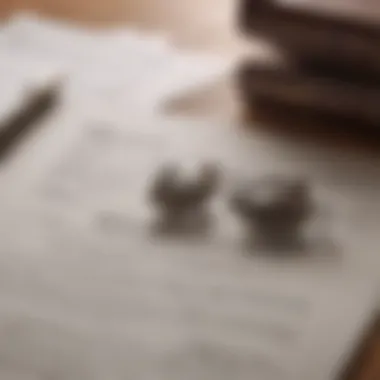Disadvantages of a Lady Bird Deed in Texas


Intro
In Texas, the Lady Bird deed is often hailed as a simple means for property transfer while avoiding probate. However, beneath its seemingly straightforward appeal lies a set of disadvantages that prospective users should consider carefully. This section aims to dissect these drawbacks with a keen eye, highlighting the legal implications, financial complexities, and personal considerations that arise when wielding this estate planning tool.
Understanding these disadvantages can similarly empower property owners, allowing them to make informed decisions that align with their unique situations.
Investment Terminology
Definitions of Common Terms
When discussing the Lady Bird deed, it is essential to comprehend some basic terminology relevant to estate planning and property transfer. A few key terms include:
- Lady Bird Deed: A specific type of property deed that allows the owner to retain control during their lifetime while facilitating a transfer upon death without going through probate.
- Probate: The legal process that validates a will and ensures that a deceased person's assets are distributed accordingly.
- Beneficiary: The individual designated to receive the property or assets of the deceased.
- Revocation: The act of canceling a previously executed document like a deed or trust.
Industry Acronyms and Abbreviations
Staying informed about relevant acronyms can further clarify discussions around Lady Bird deeds. Some commonly used ones include:
- LLC: Limited Liability Company, often relevant in the context of property ownership.
- IRS: Internal Revenue Service, which regulates tax matters pertinent to property transfer and inheritance.
- POA: Power of Attorney, which may affect decisions regarding property management and transfer prior to death.
Expert Insights and Advice
Understanding Legal Limitations
While Lady Bird deeds allow for certain freedoms, there are limitations that should be kept in mind. Since the property owner retains control, any debts or liens against the property could affect the beneficiaries after the owner's death. Furthermore, if one is not careful, the deed can inadvertently complicate future real estate transactions and loan applications.
Financial Considerations
From a financial standpoint, the appeal of avoiding probate may be counterbalanced by other costs. For instance:
- Tax Implications: Certain financial considerations can arise regarding capital gains taxes for beneficiaries, particularly if the property value appreciates significantly.
- Termination Risks: A Lady Bird deed can be revoked during the owner's lifetime, which may create uncertainty for heirs.
Potential Pitfalls
Utilizing a Lady Bird deed is not without its risks. In some cases, if one fails to properly access the property or involve legal counsel—potential oversights—could likely lead to unfavorable taxation scenarios. Being well informed comes into play here; understanding what one is signing can illuminate numerous potential pitfalls.
"Navigating the waters of estate planning with a Lady Bird deed can make or break your legacy. Always consult an experienced lawyer who can navigate the intricacies of your unique situation."
Synthesizing the Information
With an understanding of the associated disadvantages of a Lady Bird deed in Texas, one can grasp the broader implications of this estate planning tool. It is essential to weigh the legal, financial, and personal ramifications that come with this choice. Ultimately, the decision to pursue this method should be grounded in a thorough understanding of one's circumstances, ensuring that each step taken leads to a well-planned legacy.
Prolusion to Lady Bird Deeds
When planning for the future, many individuals in Texas consider a Lady Bird deed as a means to manage their real estate. This legal tool allows for a unique method of transferring property upon death while retaining some control during one’s lifetime. The importance of discussing Lady Bird deeds lies not just in their advantages but also in the myriad disadvantages that can accompany this decision.
Lady Bird deeds, also known as enhanced life estate deeds, provide property owners the ability to circumvent the tedious probate process, which can be both time-consuming and costly. However, as beneficial as they may seem, these deeds are not a one-size-fits-all solution. The complexities involved demand a thorough understanding of their implications.
Key considerations include the legal intricacies that govern these deeds, their financial ramifications, and the personal dynamics they might influence among family members. For instance, while homeowners might assume that their property will transfer smoothly to their heirs without fuss, unforeseen issues can arise that complicate this intent.
Why Should You Care?
Understanding Lady Bird deeds is crucial for several reasons:
- Legal Considerations: Knowing the laws that govern these deeds can help individuals navigate any potential pitfalls associated with them.
- Financial Impacts: It's vital to assess the tax implications and costs tied to setting up such deeds to ensure they're a financially sound choice.
- Personal Relationships: Estate planning can stir up emotional challenges, making it essential to look at how these deeds might affect family dynamics.
"An informed decision today can prevent a mountain of trouble tomorrow."


In essence, this article will delve into the various disadvantages of Lady Bird deeds in Texas, painting a more nuanced picture of this estate planning tool. It encourage individuals to weigh their options carefully, ensuring that their choices align with their long-term goals and family circumstances.
Overview of Lady Bird Deeds
Lady Bird Deeds are becoming an increasing topic of discussion among property owners in Texas, as they offer a unique way to manage estate planning without the normal complexities involved. This section highlights the significance of understanding these deeds, going beyond the surface to examine their intricacies and implications.
A Lady Bird Deed, also known as an enhanced life estate deed, allows property owners to retain control over their property while designating beneficiaries who will automatically receive the property upon the owner's passing. It’s a clever tool, a bit of an out-of-the-box solution compared to traditional methods of transferring property, such as a will. The essence of these deeds lies in the flexibility and ongoing ownership the grantor retains during their life, which sets them apart from standard life estate deeds.
Understanding how this can play out in real life is crucial. For instance, consider a widowed retiree who wishes for their children to have the family home without the headache of probate. A Lady Bird Deed can be an effective means to do this while avoiding the lingering processes that can accompany other methods. But it’s not all sunshine and roses—there are potential downsides that need to be weighed carefully.
From a legal standpoint, this approach can sidestep some tax implications that normally come with transferring ownership upon death. However, there’s a double edge to the sword; mishandling the deed or lacking proper understanding may lead to unintended consequences. Decisions made today can echo throughout the future, possibly affecting familial relationships and financial stability, so it’s worth delving deeply into the specifics.
In summary, while Lady Bird Deeds present an interesting option for estate planning, they bring along a package of considerations that knock on the door of your legal, financial, and emotional realities. As we move forward, we will break down these considerations and the potential obstacles that can arise, creating a thorough understanding before property owners make any commitments.
Definition and Functionality
A Lady Bird Deed conveys a distinct conceptualization of ownership, blurring the lines between current ownership and future inheritance. Upon signing a Lady Bird Deed, the grantor maintains the right to occupy and manage the property as they wish. In effect, they remain under the same roof, so to speak, despite having designated their beneficiaries.
Functions of a Lady Bird Deed include:
- Retaining control: The grantor can sell or modify the property without needing permission from the beneficiaries.
- Avoiding probate: Since beneficiaries inherit the property automatically, it bypasses the often tedious probate process.
- Medicaid planning: This type of deed can have implications concerning Medicaid eligibility, allowing property to be excluded from countable resources, though it’s not without its nuances.
Historical Background
The origins of the Lady Bird Deed can be traced back to Texas, where it was named after Lady Bird Johnson. She was not only a powerful figure in American politics but also an advocate for environmentalism and community development. The unique deed emerged as an innovative approach to address estate planning issues prevalent in the state.
Over the years, it has grown in popularity as property owners increasingly seek efficient solutions for transferring ownership while ensuring continued control during their lifetime. The deed reflects Texas's common law heritage, rooted in the principles of private property rights and family integrity. This historical context shapes our understanding of how Lady Bird Deeds may intertwine with contemporary estate planning needs and the objectives of preserving familial harmony while addressing the financial realities of property ownership.
Legal Considerations
When diving into the realm of estate planning, particularly with tools like a Lady Bird deed, understanding the legal landscape is crucial. This aspect encompasses not just statutes and regulations but also the broader implications on ownership and how properties are transferred. In Texas, where this form of deed holds particular significance, legal considerations can make a significant difference in how effectively an individual can achieve their estate planning objectives. A Lady Bird deed, while bringing certain advantages, also comes with its own set of legal hurdles that one should not overlook.
State Laws Governing Lady Bird Deeds
In Texas, the very foundation of the Lady Bird deed rests on specific state laws. Texas law allows property owners to utilize this type of deed to effectively transfer real estate to designated beneficiaries while retaining certain rights during their lifetime. Under Texas Estates Code, Section 255.151, this deed becomes irrevocable, meaning it can't simply be undone without the consent of all parties involved once executed.
It’s vital to understand that these laws dictate much more than just the deed's creation. They govern how disputes may be handled, how the property can be used during the lifetime of the grantor, and what happens in the case of disputes, should they arise. A misstep in understanding these rules can lead to ineffective transfers and, in worst cases, litigation among heirs. So, while the Lady Bird deed can provide a streamlined process for estate transfer, a comprehensive understanding of state laws is deeply necessary.
Transfer of Ownership
The mechanisms through which ownership is transferred via a Lady Bird deed may seem straightforward, but they require careful attention. Essentially, the grantor retains the ability to live on and manage the property while ensuring that it automatically passes to the designated beneficiaries upon their passing. This arrangement sounds beneficial on the surface, yet potential pitfalls exist.
For one, the transfer is not a sale; hence it's not subject to probate, which can save time and money. However, if there are outstanding debts associated with the property, they could complicate the transfer process. Should creditors decide to make a claim against the estate or demand payment from beneficiaries, the deed itself may not offer total protection. It's essential for individuals to have an awareness of their financial situation and how debts can impact their estate planning strategies.
Impact on Estate Planning
The implications of using a Lady Bird deed in the context of broader estate planning scenarios are profound. While it offers an alternative to traditional wills and trusts, it may not perfectly fit every individual’s needs. For example, this deed avoids probate, which might appear favorable; yet, it does not allow for the same level of control as a trust might with regard to how assets are managed posthumously.
In addition, there’s the matter of tax implications that come into play, not just for the estate but also for the beneficiaries who inherit the property. Differences in tax basis and potential capital gains taxes can heavily influence whether a Lady Bird deed serves the intended purpose of the grantor. As such, individuals are strongly advised to consult with legal and financial experts to ensure that all angles are considered in their estate planning.
"Legal nuances in estate planning can be as intricate as a spider's web; one misstep can unravel the entire structure."
In summary, when contemplating a Lady Bird deed, being well-versed in legal considerations is paramount. Knowing the specific state laws, the effects on property transfer, and the broader consequences for estate planning can greatly inform decision-making. It's not merely about execution; it’s about understanding the full canvas where these legal tools fit.
Financial Implications
Understanding the financial implications is crucial when considering a Lady Bird deed in Texas. While this estate planning tool can provide several benefits, it's essential to evaluate the costs and potential long-term effects that come with it. This not only aids in making informed decisions but also ensures that property owners are aware of what lies ahead financially, thus fostering a sound strategy for wealth preservation.
Tax Consequences


A property owner considering a Lady Bird deed should keep tax consequences at the forefront of their minds. The intended goal is preserving tax benefits while transferring property to heirs without the burden of probate. However, transferring ownership this way can trigger specific tax implications, particularly concerning property taxes. In Texas, property taxes are tied to ownership; therefore, a Lady Bird deed allows the original owner to retain those taxes if they remain in residence. But, should the property be sold after the owner's passing, the heirs could face capital gains taxes based on the house's appreciation.
Key Points on Tax Consequences:
- Retaining homestead exemption: The original owner keeps the homestead exemption while living in the home.
- Potential capital gains tax: If not handled properly, heirs might be liable for taxes on the home's increased value at the time of sale.
- Assessment of property taxes: Changes in ownership can lead to new assessments if the heirs decide to rent or sell the property.
Costs associated with Preparation and Filing
Preparation and filing costs can sneak up on unwary individuals. Unlike a straightforward will, a Lady Bird deed necessitates careful drafting to ensure it meets legal requirements. Engaging an attorney’s services might be advisable for most people to navigate the intricacies involved, which can incur significant fees. Additionally, a filing fee is often required when placing this deed with the county clerk. These initial costs can add up quickly, thus stressing the importance of considering this financial aspect before proceeding.
Financial Breakdown:
- Attorney fees: Can vary widely, typically ranging from a few hundred to several thousand dollars.
- Filing fees: Usually a nominal fee, but it varies by county.
- Potential additional costs: Might include consultations or further legal assistance should complexities arise.
Long-term Financial Effects
It's one thing to consider immediate financial ramifications but entirely another to evaluate the long-term effects that a Lady Bird deed can impose. While this deed may seem advantageous initially, one must look beyond the surface. For instance, if one’s heirs are unprepared to take over the property upon death, unexpected costs can crop up. Things like maintenance, property taxes, and the likelihood of properties becoming liabilities rather than assets warrant thorough examination.
Considerations for Long-term Effects:
- Liabilities after property transfer: Heirs may face significant expenses if the property needs repairs or renovations before selling.
- Ongoing maintenance costs: Real estate generally requires upkeep; if heirs do not have the resources or willingness to manage a property, it could quickly turn into a burden.
- Impact on estate value: It’s vital to think about how changes to the property might alter the estate’s overall value.
In summation, while a Lady Bird deed may appear to offer a straightforward path to property transfer, the financial implications are layered and complex. Savvy property owners ought to weigh these considerations tightly to prevent unexpected pitfalls down the road.
Potential Personal Challenges
When it comes to Lady Bird deeds, the personal aspects often fly under the radar but are crucial to consider. Establishing a plan for one's property isn’t just a financial transaction; it's woven into family relationships and emotional landscapes. A Lady Bird deed, while beneficial in many ways, can also stir up personal challenges that need careful thought. Let's break it down, focusing on family dynamics and emotional considerations, both of which can significantly impact the outcomes of estate planning.
Family Dynamics
Family dynamics play a pivotal role in how Lady Bird deeds are perceived. On the surface, this type of deed appears straightforward—transferring property while retaining certain rights. However, it can usher in a whirlwind of family reactions, both good and bad. Here are several points to ponder:
- Expectation Mismatches: Bringing a Lady Bird deed into the family can set expectations on who inherits which properties. If not everyone is on the same page, misunderstandings can quickly turn sour.
- Siblings and Fairness: Siblings might feel slighted if they believe they’re getting a raw deal from the estate arrangement. Thoughts around fairness often bubble to the surface, sometimes creating tensions.
- Communication is Key: It’s essential to have open discussions about the plan. A family meeting might work wonders to clarify intentions and dispel any notions of favoritism.
Ultimately, being proactive and discussing the implications of a Lady Bird deed can help avoid familial disputes that could arise posthumously.
Emotional Considerations
Handling property transfers isn't just about legal paperwork; there’s an emotional weight to it as well. Lady Bird deeds are laden with potential emotional pitfalls that can haunt families. Let’s look at some pertinent elements:
- Grief and Loss: When loved ones pass, the emotional burden can be heavy. Adding property complications to this mix can intensify feelings of grief and conflict. The stress of decision-making around the estate can overwhelm individuals when they’re least emotionally prepared.
- Feelings of Guilt: If one family member takes on the role of trustee or caretaker via a Lady Bird deed, they might feel guilt about their responsibilities or any perceived advantages they are gaining.
- Resentment: If decisions are made without collective input, it can create an undercurrent of resentment. A single member making choices can lead to a fracturing of relationships.
In navigating these emotional waters, it's critical to foster an environment of understanding and empathy. Facilitating conversations about roles, responsibilities, and emotional burdens may contribute to healthier family relationships.
Personal relationships are often more complex than they appear on the surface. The emotional landscape of securing a Lady Bird deed is just as important as the legal shield it provides.
Risks Involving Creditor Claims
When dealing with estate planning in Texas, the question of liabilities often comes up, especially concerning Lady Bird deeds. This section sheds light on how these deeds interact with creditor claims. Understanding this dynamic is essential; it could markedly influence your estate's future. The blanket assumption that a Lady Bird deed offers complete protection from creditors might be misleading at best.
Protection from Creditors
A fundamental appeal of a Lady Bird deed lies in its potential to provide a layer of protection against creditor claims during a person's lifetime. The deed allows an individual to transfer property to a beneficiary while retaining certain control rights. However, this does not guarantee immunity from creditors.
In certain situations, like bankruptcy or if you owe money that could be claimed by creditors, assets tied up in a Lady Bird deed can still be pursued. Creditors might go after the property even if it’s not in your name anymore, particularly if the transfer is deemed a fraudulent conveyance.
Moreover, property tax liens or child support obligations could take precedence, posing a risk to your heirs.


Implications of Debt on Lady Bird Deeds
Debt can significantly affect the standing of a property under a Lady Bird deed. For example, if a homeowner faces significant debt, that debt could carry over even after the property has been deeded to a beneficiary. When the original owner passes away, and the beneficiary steps in, they may find themselves unexpectedly burdened with that debt.
- Potential impacts include:
- Loss of the property: Creditors can initiate foreclosure proceedings against the property, jeopardizing the beneficiary’s inheritance.
- Inherited liabilities: Beneficiaries could find themselves responsible for debts associated not only with the property but potentially other financial obligations tied to the deceased.
- Difficulty in selling or refinancing: If there's a lien on the property, it can complicate the selling process or alter the ability to obtain new financing.
In summary, while a Lady Bird deed offers flexibility in estate planning, the implications of creditor claims and existing debts should not be overlooked. The interplay of these elements deserves careful consideration for individuals eager to navigate this path in estate management.
Comparative Analysis with Other Estate Planning Tools
In the maze of estate planning, a Lady Bird deed occupies a unique niche, but it’s essential to hold it up against other tools available. This comparative analysis not just sheds light on the virtues but also the drawbacks of each method. Understanding these differences can help you make sound decisions for your property and your heirs. In essence, knowing one’s options is half the battle in effective estate planning.
Lady Bird Deed vs. Traditional Life Estate
When considering a Lady Bird deed alongside a Traditional Life Estate, one of the most significant distinctions lies in the flexibility they each offer. A Traditional Life Estate grants the right to live in the property until death, after which ownership passes to the remainderman. However, this arrangement can be a double-edged sword. Once a life estate is created, the life tenant often cannot sell or mortgage the property without the agreement of the remainderman. This restriction can create tension among family members and potentially tie up assets for long periods.
Conversely, the Lady Bird deed allows for the life tenant to have full control over the property during their lifetime. This means they can sell, rent, or mortgage the property without needing to consult anyone else — the remainderman gets a mere stake in the future. Moreover, the asset bypasses the probate process, which can be a real headache for beneficiaries.
- Flexibility: Lady Bird deeds provide greater flexibility and control over the property.
- Probate Avoidance: Both methods help in avoiding probate, yet Lady Bird deeds often do this more smoothly.
- Family Dynamics: Conflicts among family members can manifest differently; Traditional Life Estates might breed disputes on asset utilization.
In summary, where a Traditional Life Estate presents restrictions and potential conflict, the Lady Bird deed shines in autonomy and ease of transition.
Lady Bird Deed vs. Trusts
Now, turning to Trusts, we enter another realm of estate planning that often offers more comprehensive solutions than just transferring property. Trusts can be tailored to meet specific needs and can manage a wide array of assets beyond real estate, including bank accounts and valuable collections.
Lady Bird deeds might be cheaper and simpler to execute than setting up a trust, but they come with a couple of drawbacks when compared directly. For one, Trusts provide asset protection from creditors, while Lady Bird deeds might not fully shield assets from claimants. Creditors could potentially stake a claim on a property managed under a Lady Bird deed due to its direct relation to the grantor until their death.
Additionally, Trusts can be crafted to meet both tax planning and beneficiary management goals, making them more adaptable to varying financial circumstances over time. A Lady Bird deed generally sticks to real estate transfer, which may not suit every complex situation.
- Asset Protection: Trusts fare better in shielding assets from creditors, a crucial factor for those in business or volatile industries.
- Complexity: While Trusts can be intricate, they often allow for much broader estate management strategies.
- Costs and Upkeep: On the flip side, setting up a Trust may involve higher initial costs and maintenance fees; however, Lady Bird deeds tend to be straightforward once filed.
To sum up, the choice between a Lady Bird deed and a trust boils down to individual circumstances. If you need flexibility and simplicity in dealing only with real estate, the Lady Bird deed might serve you well. But if you require nuanced management of a robust portfolio and need protective measures against creditors, a Trust could be the better fit.
"A thoughtful comparison of estate planning tools can empower you, ensuring that the legacy you leave behind aligns with your wishes and protects your loved ones."
In essence, the right estate planning tool depends on various factors, including asset type, familial relations, and long-term goals.
Culmination
The importance of concluding our examination of the disadvantages of a Lady Bird deed in Texas cannot be overstated. This section serves as a synthesis of the insights gathered throughout the article. A Lady Bird deed, while offering some distinctive benefits, is not without its pitfalls—understanding these pitfalls is crucial for property owners and estate planners alike.
When delving into estate planning, it is vital to weigh every option against one’s specific circumstances. A Lady Bird deed allows property to transfer outside of probate, which can speed up the process and prevent complications during ownership transfer. However, factors such as potential complications in family dynamics and creditor claims can arise. Each of these elements plays an important role in determining whether a Lady Bird deed aligns well with one’s estate planning strategy.
Consideration of these disadvantages not only fosters informed decision-making but also highlights the need for alternatives in certain contexts. By recognizing when a Lady Bird deed may not serve an individual’s best interests, one can approach their estate planning with eyes wide open. The goal is to position oneself and their heirs as favorably as possible—after all, estate planning is about safeguarding your legacy while maintaining harmony within the family.
Final Thoughts on Lady Bird Deeds
Lady Bird deeds, named after the former First Lady of the United States, are often seen as a smart choice for estate planning—allowing smooth title transfer while retaining control during one’s lifetime. However, they are not a catch-all solution. Many individuals overlook the complexities tied to these documents. For instance, if property owners pass away while the deed is in place, it might bring about unforeseen tax implications for beneficiaries. It's not just about the mechanics of the deed; it’s about understanding the real-life fallout.
Families can also face challenges if one beneficiary feels favored over others. Such dynamics can lead to strife that overshadows the core intentions of a Lady Bird deed. Empathy and clear communication can play pivotal roles in mitigating these familial tensions. After all, it’s not just about property transfer; it’s about preserving relationships.
When to Consider Alternatives
In certain scenarios, opting for alternatives to a Lady Bird deed makes more sense. For instance, when the possibility of creditor claims is significant, considering a trust might be a stronger safeguard for assets. Trusts can offer more nuanced protection, ensuring that property is truly inherited without the risk of being stripped away due to outstanding debts.
Additionally, if estate complexity increases, or if the property has sentimental value tied to multiple family members, developing a broader estate plan, which could include wills or various trust structures, may provide a more comprehensive solution.
- Assessing Personal Circumstances: Consider consultation with a financial advisor or estate planning attorney.
- Exploring Trust Options: Trusts may provide asset protection and clarity not offered by Lady Bird deeds.
- Evaluating Family Dynamics: Think about how a Lady Bird deed could affect familial relationships in the long run.
It's essential to navigate these decisions with care. Knowledge is power, and in the world of estate planning, it can make a monumental difference. By thoroughly analyzing all options, individuals can ensure their estate planning decisions reflect their true wishes and minimize any potential conflicts for their loved ones.







